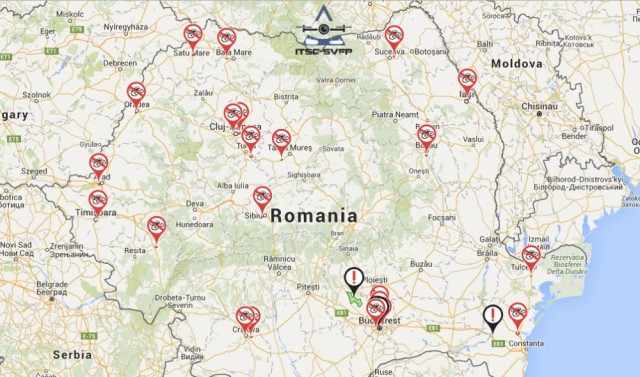The first private institute for drones in Romania was founded at Medias, in Sibiu County. The Training, Studies and Research Institute for Unmanned Vehicle Systems (ITSC-SVFP) will raise awareness regarding potential incidents involving drones. The initiative is a new step in the path towards defining the legal status and functioning of drones in Romania.
Drone owners in Romania can avoid potential accidents by signing up free of charge on the website created by the ITSC-SVFP institute, according to co-founder Octavian Isaila, who also owns the first officially-identified drone in Romania, quoted by Agerpres newswire. The Institute was founded by 14 members from Romania.
“We built an online system where anyone who has a drone can log in and announce where, when and at what height they will be flying. Within the institute, the RPAS (Remotely Piloted Aircraft Systems) System of National Alert and Notification was developed for the community of drone operators in Romania. It is designed as an online system that should come to the aid of all owners and operators of civilian drones in Romania, either individuals or companies, so that potential incidents can be avoided,” said Isaila.
However, drone owners are under no obligation to post this announcement, “because the law, at this time, forbids them to fly,” added Isaila.

The alert system allows the registration of users, the introduction, modification and visualization of drone flights on Romanian territory. It also includes segregated areas, where special attention should be paid, test areas, airports, stadiums and other sensitive areas, according to Agerpres.
The institute will also organize training courses for drone owners.
“We intend to offer a one-day initiation course at EUR 99. We wish to explain the theoretical training from A to Z and what they should look out for when they are operating a toy like this one,” said Isaila.
The matter of drone circulation on Romanian territory should receive more attention from regulators, Romanian officials previously argued.
“Fitting legal measures must be put into place concerning drones. This area should be regulated, just like all the others, because after all, this will pose traffic issues. It is clear as day that an air traffic code must appear,” according to Varujan Pambuccian, member of the Commission for IT&C in the Chamber of Deputies, who was a speaker at the Business Review Foreign Investors’ Summit event.
The initiative of the ITSC-SVFP institute was hailed by the Romanian Civilian Aeronautic Authority (AACR) officials, who labeled it as “an unexpected and innovative step of the civil society.”
“AACR hails any initiative meant to identify and implement measures that result in increasing flight safety and raising awareness among users regarding the perils that come with the uncontrolled use of the new technologies in the aeronautic field,” according to Remus Dogaru, head of the AACR’s office for national certifications, quoted by Agerpres.
“We urge all users of RPAS vehicles to come to AACR to identify these vehicles,” said the AACR representative.
At the moment, 130 unmanned vehicle systems have been identified with the AACR. These are being used to perform various air works, as well as for general aviation activities such as shooting, photography and surveillance.
The unregulated or illegal use of drones is a problem that is under debate in other countries as well.
“As a result of incidents/accidents that involved vehicles of this type, states such as France, Great Britain and the USA are analyzing and updating the national legislation applicable to unmanned vehicle systems. Romania is aligning to this trend, starting, in partnership with the civil society, a lengthy process of updating the specific aeronautic legislation and raising awareness among users on the possible dangers and legal consequences regarding the illegal use of unmanned aerial vehicles,” said Dogaru.
In Europe, The European Aviation Safety Agency (EASA) is the only body authorized to certify UAVs and certifications are granted on a case-by-case basis under the EASA policies.
Source: BR Business Review

